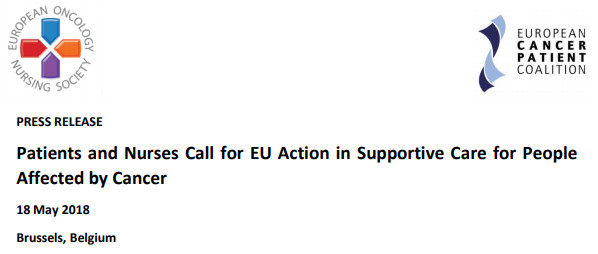
Patients and Nurses Call for EU Action in Supportive Care for People Affected by Cancer
Date
Fri, 05/18/2018
Sections
Health & Consumers

On the occasion of the European Cancer Nursing Day on Friday 18 May, the European Cancer Patient Coalition and the European Oncology Nursing Society have published the report on Supportive Care for people affected by cancer. The report is the outcome of the Round Table held in February, which was held jointly together with MEP Lieve Wierinck (ALDE, Belgium). Supportive care is the prevention and management of the symptoms of cancer and its treatment from diagnosis to the end of life. It includes support for people with cancer, their families, and their carers. Supportive care for people with cancer is pivotal for rehabilitation, secondary cancer prevention, survivorship and end-of-life care.
The Round Table and report promote the importance of supportive care and cancer nurses in Europe, with a particular focus on cancer-associated thrombosis as well as chemotherapy induced nausea and vomiting.
For people with cancer, supportive care is vital. The report identifies the main challenges and solutions for improving supportive care for people with cancer, and delivers a five-point call for action:
1. Policy-makers, patient groups and nursing groups should collaborate to develop specific training exchange programmes in oncology for nurses during their education.
2. Patient and nursing groups, through the support of Members of the European Parliament and Members of National Parliaments, should continue to inform their communities about the importance of supportive care.
3. Patient and nursing societies should raise further awareness on cancer-associated thrombosis as well as chemotherapy-induced nausea and vomiting, and collaborate with policy-makers to ensure further investment into primary and secondary prevention of these and other conditions.
4. Stakeholders should advocate for the recognition of nurses’ specialisations both at European and national levels, and for the further communication skills training for oncology nurses.
5. The European Commission should consider cancer-associated thrombosis as well as chemotherapy-induced nausea and vomiting as key indicators in good cancer care and health system performance reviews.
“The cancer care team are the front runners in informing patients as well about the side effects of cancer treatment, a treatment which can harm the healthy tissues in our bodies. Some of those side effects are for example nausea and vomiting, which remain an important adverse effect of treatment, and occur more often in younger people.” MEP Lieve Wierinck.
Notes to editors:
About the European Cancer Patient Coalition
The European Cancer Patient Coalition is the largest European cancer patients' umbrella organization.
The European Cancer Patient Coalition is the voice of cancer patients in Europe. With over 400 members, ECPC is Europe’s largest umbrella cancer patients’ association, covering all 28 EU member states and many other European and non-European countries. The European Cancer Patient Coalition represents patients affected by all types of cancers, from the rarest to the most common.
About the European Oncology Nursing Society
The European Oncology Nursing Society is a pan-European organisation dedicated to the support and development of cancer nurses. Through their individual members and national societies, they engage in projects to help nurses develop their skills, network with each other and raise the profile of cancer nursing across Europe.
About supportive care
Cancer supportive care ensures that patient’s needs are addressed by ensuring the patient’s pain, other physical symptoms, and mental health are well managed. Supportive care should provide accurate information to assist people with cancer and their carers in understanding the side-effects of chemotherapy and giving them the opportunity to participate in the decision making around their care.
About cancer-associate thrombosis
Cancer is a disease characterised by a multitude of side effects and complex care pathways. One of the most important and potentially dangerous side-effects is the possibility of developing a blood clot. This condition is known as cancer-associated thrombosis.
About chemotherapy induced nausea and vomiting
Chemotherapy induced nausea and vomiting are amongst the most distressing side effects for people with cancer. Supportive care, information and interactions with the cancer care team are crucial components of coping with these adverse effects.
NOTES TO EDITORS
For more information please contact: alex.filicevas@ecpc.org
Follow us on Twitter: @cancereu
